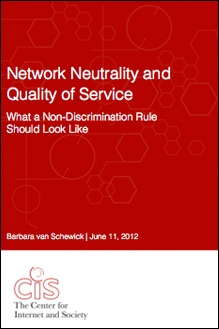Center for Internet and Society Director Barbara van Schewick Provides Roadmap for Enforcing Net Neutrality Rules
New white paper by leading net neutrality scholar discusses the Federal Communications Commissions Open Internet rules and the relationship between network neutrality and Quality of Service
STANFORD, Calif., June 11, 2012 –Barbara van Schewick, faculty director of the Center for Internet and Society at Stanford Law School and a professor of law and electrical engineering at Stanford University, today published a white paper titled, “Network Neutrality and Quality of Service: What a Non-Discrimination Rule Should Look Like.”
Currently, the relationship between network neutrality and Quality of Service is uncertain and contentious. Often, it is not immediately apparent how a specific non-discrimination rule affects network providers’ ability to offer Quality of Service. At the same time, it is unclear which forms of Quality of Service, if any, a network neutrality regime should allow. The paper explains how eight different non-discrimination rules affect network providers’ ability to offer Quality of Service and which forms of Quality of Service, if any, a non-discrimination rule should allow.
The paper:
* Provides the first detailed analysis of the FCC’s non-discrimination rule and of its implications for network providers’ ability to manage their networks and offer Quality of Service;
* Offers the first in-depth analysis of the relationship between network neutrality and Quality of Service; and
* Proposes a non-discrimination rule that policy makers should adopt around the world – a rule that the FCC adopted at least in part.
The paper is particularly timely. This month, the FCC announced the members of its Open Internet Advisory Committee, and, whether the FCC wins or loses the legal appeal of the Open Internet order, the question of which, if any, network-discriminations require legal action will remain relevant for years to come in the United States. In addition, across the Atlantic, the group of European Regulators for Electronic Communication Networks and Services (BEREC) started a consultation in June focused on various aspects of the relationship between network neutrality and Quality of Service–the very topics rigorously addressed in this White Paper.
According to Professor Barbara van Schewick:
“Many network neutrality proponents were disappointed by the FCC’s Open Internet rules. While they are not perfect, they provide the FCC with a powerful set of tools to protect users and innovators against discrimination by providers of Internet service. In addition, the FCC can rely on the network neutrality conditions governing the C-Block of the 700 MHz Band, purchased by Verizon Wireless, and those in the Comcast-NBC merger agreement – if the FCC were interested in using these tools.”
“The network neutrality debate is often framed as a debate for or against Quality of Service. The reality is much more nuanced. Many network neutrality proposals allow some, but not all forms of Quality of Service. Many forms of Quality of Service allow Internet service providers to distort competition among applications and interfere with user choice. These forms of Quality of Service should be banned. However, some forms of user-controlled Quality of Service do not similarly threaten application innovation, competition or user choice. They provide the social benefits of different types of service without the social costs. These forms of Quality of Service are the ones a network neutrality regime should allow. Thus, it is possible to protect users and innovators while allowing the network to evolve. Regulators can have their cake and eat it, too.”
The full paper and an executive summary can be downloaded here:http://cyberlaw.stanford.edu/publications/network-neutrality-and-quality-service-what-non-discrimination-rule-should-look
About Barbara van Schewick
Barbara van Schewick is an Associate Professor of Law and Helen L. Crocker Faculty Scholar at Stanford Law School, an Associate Professor (by courtesy) of Electrical Engineering in Stanford University’s Department of Electrical Engineering, Director of Stanford Law School’s Center for Internet and Society, and a leading expert on network neutrality.
Her research on the economic, regulatory, and strategic implications of communication networks bridges law, networking and economics. Her book Internet Architecture and Innovation (MIT Press 2010) is considered to be the seminal work on the science, economics and policy of network neutrality. Her papers on network neutrality have influenced regulatory debates in the United States, Canada and Europe. Van Schewick has testified before the FCC in en banc hearings and official workshops. In October 2010, van Schewick received the Research Prize Technical Communication 2010 from the Alcatel-Lucent Stiftung for Communications Research.
A longer bio is available at: http://cyberlaw.stanford.edu/about/people/barbara-van-schewick.
About the Center for Internet and Society
The Center for Internet and Society (CIS) is a public interest technology law and policy program and a part of the Law, Science and Technology Program.
The Center’s homepage is at: http://cyberlaw.stanford.edu.

